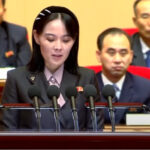
UNITED NATIONS (AP) — The divided U.N. Security Council was scrambling to reach agreement on whether to extend travel exemptions for 13 Taliban officials now ruling Afghanistan that are set to expire at midnight Friday.
Diplomats said Russia and China want to allow all 13 to continue to travel while the U.S. and Western nations are determined to cut the number to protest the Taliban’s rollback of women’s rights and failure to form an inclusive government as it promised.
Dozens of Taliban members have been on the U.N. sanctions blacklist for years, subject to a travel ban, asset freeze and arms embargo. But some Taliban officials were granted waivers so they could travel to participate in talks aimed at restoring peace and stability to Afghanistan.
Since the Taliban takeover of Afghanistan last August 15 as U.S. and NATO forces were in the final stages of their chaotic withdrawal from the country after 20 years, as many as 700 people have been killed and 1,400 wounded even though security on the whole has improved, according to a report last month by the U.N. political mission in Afghanistan. It highlighted how women have been stripped of many of their human rights, barred from secondary education and subjected to restrictions on their movements.
In June, the Security Council committee monitoring sanctions against the Taliban banned two Taliban officials from traveling in response to their crackdown on women — Said Ahmad Shaidkhel, the acting deputy education minister, and Abdul Baqi Basir Awal Shah, also known as Abdul Baqi Haqqani, the acting Minister of Higher Education.
With the expiration of travel waivers for the remaining 13 Taliban officials looming, the United State on Thursday proposed re-imposing the travel ban on seven of them and keeping the exemption for six others, but limiting their travel only to Qatar, where U.S.-Taliban talks have taken place, council diplomats said, speaking on condition of anonymity because discussions have been private.
Russia and China made a rival proposal that all 13 Taliban officials be granted travel exemptions for 90 days, but only to go to Russia, China, Qatar and “regional countries,” the diplomats said.
Russia and China objected to the U.S. proposal, the diplomats said, and the United Kingdom, France and Ireland opposed the Russia-China proposal, insisting that the exemption can’t continue for all 13 officials because of the Taliban’s lack of progress on meeting its commitments on women, forming an inclusive government and other issues.
On Friday afternoon, diplomats said, the U.S. revised its proposal which would ban travel for seven of the Taliban officials and keep the travel waivers for six others for 90 days with no geographic limits.
Unless the 15 council members reach agreement before midnight Friday, a travel ban will be re-imposed on all 13 Taliban officials.




